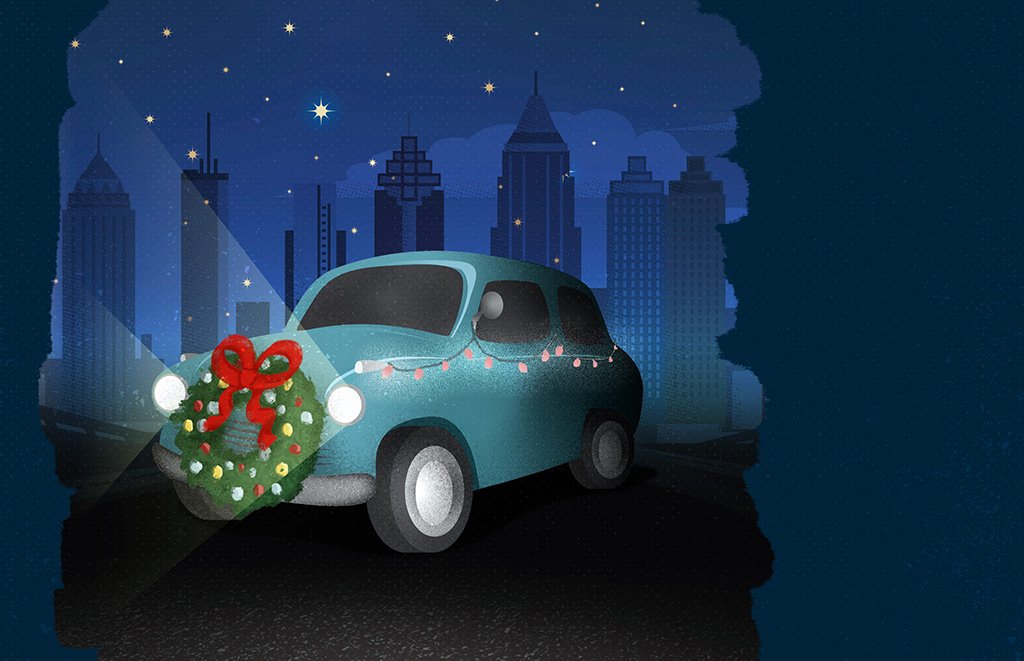"It feels very sacred to offer audiences a space to come together and to reconnect to a tradition, and perhaps even more importantly, to each other."
Leora Morris is no stranger to the Alliance, being a Resident Artist and having directed shows such as Naked Mole Rat Gets Dressed: The Rock Experience and Ride the Cyclone (for which she received a Suzi Bass Award for Best Direction and Best Production of a Musical.) From a Yale School of Drama MFA, to working as a Yale Directing Fellow, we could think of no better to take on this year’s one-of-a-kind version of A Christmas Carol. We recently had the chance to (virtually) sit down with Leora and ask her some big questions about this experience. Check it out below.
What are your first memories of Charles Dickens’ A Christmas Carol?
The first time I saw A Christmas Carol (ever, in my whole life!) was opening night of the Alliance Theatre’s production in December 2016. It was the last year the production happened on that stage before it renovated into what is now the Coca-Cola stage. Sitting in the audience, knowing the theatre was going to be demolished, I felt so aware that we were celebrating and saying goodbye to two decades of people’s holiday memories. The seats and walls and scenery and costumes had stayed constant while the cast, the audience, the city, the world had changed. It felt like the play itself - tender, joyful, and hopeful.
Aside from the Alliance Theatre’s, of course- do you have a favorite version? (i.e. The Muppets Christmas Carol?)
I’m definitely a big fan of the Muppet Christmas Carol! I actually haven’t really seen too many of the other versions. I’m Jewish and have never really celebrated Christmas, so my holiday experience tends to consist of Chinese takeout and going to the movies.
How is this year’s A Christmas Carol different from before? What can audiences expect?
At the heart of this year’s event is the story of A Christmas Carol that we all know and love (and many familiar songs), but just about everything else is different! Audiences will be congregating in their cars and listening to the show over their car radios. Live and onsite, a teeny tiny cast will voice the dozens of characters in the story, while a live sound effect artist will bring the world of the story to life sonically. Plus, live feed cameras will give audiences a chance to watch the cast at work while they create all those sounds. It’s like a reverse drive-in - instead of the radio supporting audiences while they watch a movie, in our show, the videos will give audiences a sneak peak behind the radio play! While listening to the story, we’ll be inviting the audience to participate and play along right inside their cars – with things like crafts, games, and sound-making. And we’ll be recruiting the audience’s help a couple of times along the way. ( :
How do you feel taking on such a big Atlanta tradition? How do you feel taking it on during such a weird time?
I’m so honoured to get to collaborate on this show - especially this year. So much of 2020 has been spent separated from each other, and so little about 2020 has been normal. It feels very sacred to offer audiences a space to come together and to reconnect to a tradition, and perhaps even more importantly, to each other. While we can’t do that by getting close to each other physically, radio allows us to use our voices in a way that’s very intimate -- it will feel like the cast is right in the car with you. It’s been a fun challenge to think about bringing this familiar story to life for people inside their cars, just using sound. And we’re working on creative ways to get audiences to connect with each other, too.
Why A Christmas Carol? Why now?
Charles Dickens wrote A Christmas Carol out of his despair about the extreme inequalities and injustices he was witnessing in Victorian England. So while A Christmas Carol is a story about one man’s transformation from a self-centered, miserly person into a community-minded, generous one, it is also about the world Scrooge lives in; one that desperately needs him to transform so that it, too, can transform. Tiny Tim only survives if people with resources and power decide he is worth their attention and advocacy. Without that advocacy, he is an optimistic, graceful young boy, without a fighting chance. This is a story of a waking up. And just like it is for Ebenezer Scrooge, A Christmas Carol is our annual theatrical opportunity to reflect on our past, be in our present, and think about our future. It matters so deeply to all of us making this show, that we honour Charles Dickens call to see our pasts clearly, notice what’s happening in the present, and actively build a future we believe in for those who come after us.
Has this time changed you? Both as an artist and human? How?
Oof. So many ways. It has made me realize how much of what I love about my job is physically being in space with other people; I miss the way the air crackles. And I miss how each project in the theatre is an opportunity to model a way of being, a mini-world, a small utopic experiment in community-building. It’s been gutting to see the impact of Covid-19 and to watch the murder of George Floyd, but I am hopeful that the dovetailing of this forced pause and the global call for justice and equality for all people can result in true, deep change to our systems. I hope this production is a step in the right direction towards that change.
Learn more about this year's A Christmas Carol




